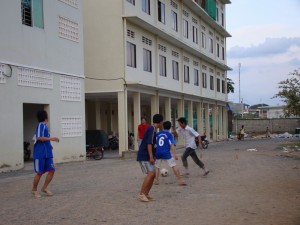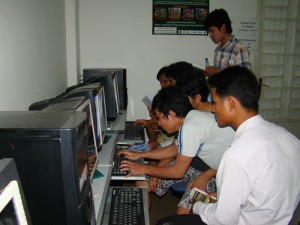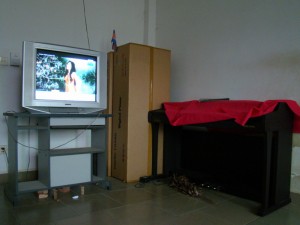Education is simply defined as a process by which people acquire knowledge, skills, habits, values, or attitudes. Process of teaching and learning has existed in human society since thousands years ago. Human beings have been learning, thought informal, from world around them to find ways to change their society and to improve the quality their living. Initially, people lived in a primitive society called hunting and gathering society in which they depended totally on nature and earned for living by hunting animal and gathering eatable fruits and plants. Later on, people started to learn to find ways to be independent from the nature. They produced plough for farming and knew how to build reservoirs to store water for agriculture and household uses that made their food supply more stable. The invention of steam engine in 1765 was a remarkable turning point in human history that drove people into an industrial era. Most noticeably, the exploring computer and other information technologies just recently are turning human history upside down; all parts of the world seem to be much closer, and lives become much easier. The evolution of society and human history above, sure, would not occur if there was absence of education. Thus, to some aspects, education is playing a vital role in making the betterment of people and their society.
Education is acting significantly in eradicating poverty in a nation. There are many factors leading to poverty, but the major ones are unemployment, poor health and domestic violence, which, generally seen, are rooted from low level of education. In free and strongly competitive market, effective and efficient production is a main concern of all producers to extend it supplying power in the market. By this, they require workers and employees who are more and more skilled, meaning jobs for unskilled workers are dwindling day by day. A long with this, health condition of people also closely relates to educational level of them. Millions of people around the world are dying of curable diseases and around 30 thousands of children are killed by prevented illness (Real Aid, 2005). Most of them are illiterate. They do not know how to deal with heir health problems or how to live healthily. They still depend mostly on customary medicines or traditional practices which are influenced by superstition to cure their illness. Consequently, this is a disaster for their whole nation when millions of people are not productive and stats have to spend large amount of their budget in health care program. A long with this, illiterate people tend to commit domestic violence more often than educated ones, which makes them waste their time in earning for living and drives them to poverty.
However, as mentioned above, the factors are mainly resulted from low level of education among people. Thus, by promoting education or making education widely available to school-age people can eliminate the factors. Education, obviously, promotes understanding and skills amongst people and makes them qualified to employment market. Through formal education, which is mostly conducted at schools, students can learn many different subjects such as science, philosophy, history, and so forth which they can apply into their daily lives and careers. A long with this, people who can not access a formal one can attend in informal education in which skills and other practical knowledge are taught. People can do courses in mechanics, constructing, tailoring, carpentry, cooking and others on which they can depend to earn for living. Consequently, that more and more people are knowledgeable and skilful attracts more and more foreign investors and increases job opportunity and accelerates income for people. Furthermore, when people are educated, their health, accordingly, is also improved because they know how to keep themselves healthy and how to raise their children healthily. They become aware of how important medicines and vaccines are for their lives. As a result, the rate of mortality will decrease. As stated in the WHO’s report called “Controlling SIT/HIV in Cambodia” (2001), there was a decline in the rate of Cambodian people newly infected HIV from 3.9{0a5c1eeb84ccc7c2d601964b33dd4fc73dc6a68f91616e3e53041e90b1033ab3} (210.000) of the 15 to 49 years old in 1997 to 2.8{0a5c1eeb84ccc7c2d601964b33dd4fc73dc6a68f91616e3e53041e90b1033ab3} (169.000) in 2001. This was believed to be a result of successful efforts to increase condom use among those most at risk through a public education campaign about the dangers and consequences of HIV launched by the government in 2000. This is evidence illustrating that education is a fruitful measure to keep people healthy.
Besides, education can ensure a sustainable development for a nation. Sustainable development refers to a development that does not bring any harm to environment and residents (Hornby, 2000). Actually, not all development projects benefit to people and their nation. Some of them, though, can provide millions of dollars to the national budget; they have provided nothing but pollutants to surrounding residents and environment there. To be sure that one development project is profitable or not, reliable researches and studies must be conducted. Surely, these can not be achieved if there are not enough national technicians and specialists. By using the mechanism of education, many people will be educated to be specialists, technicians and researchers that will work fruitfully in observing all development projects. Beside this, national development policies will be more effective and workable when more and more people comprehend a concept of sustainable development. For instance, in 1996, hundreds of Costa Ricans protested the government and asked it to cancel the Placer Dome Company’s open-pit gold mine project when they learned that the project harmed the environment and local inhabitants. To respond, the government of Costa Rica decided to end the project (Shively, 2007).
Furthermore, education paves the way for researching for new technologies that can ease people’s living and improve national productivity. With the support from modern technologies, the quality of products must be upgraded and speed of production increase at the same time; this will become a strong point of a nation’s economy in international competitive market. As clear evidence, because labor cost in the United States is so high comparing to other developing countries such as China and India, its goods are hard to compete with ones coming from developing countries. To solve with this, US invested millions of dollars into education and research for the new technologies to be applied in manufacturing. As a result, US still sustained it economic growth, for their scientific and technological capacity outperformed in producing high-tech goods and services (Shively, 2007).
National identity can be preserved and promoted well by education. At school, students are required to learn their history, culture, art and so on. By this way, national identity is passed on from a generation to another. Students can know where their ancestors came from, what languages they are speaking originate from. It is education that our history and identity are known nationwide. Historians, artists, philosophers and specialists in other fields who are the achievement of education can do more researches, compile documentations or recover hidden history or culture to clarify their national identity. Nowadays, we have obtained more and more knowledge of our past history and our specialists have developed more and more precise theories that our next generations can count on for their studies and their next researches. Thus, we can not only preserve the existing heritage but also widen the understanding of our culture, history, and keep passing on to next generations.
Additionally, education can be used as an effective mechanism to reduce conflict in society and promote world peace. It broadens the sense of belonging and unity by teaching basic understanding of social needs, culture, human right, and people can be taught the social norms which are helpful for them to adjust to rapid change of society. Students learn what their duties are for their society that helps them to be active social members. Anti-racial, human right and law education also help them to reduce the sense of discrimination between races in society and cut down in great distance racial disputes in all societies, avoid committing activities violating other people’s right or nation’s law. Gender education teaches them the concepts of gender equity and the importance of cooperation between males and females in national development and family welfare. It is through education that provides chance to people in all nations to know one another and let them learn to share the world and have the same dream of living peacefully together. As a result, a hyper-nationalism which was once seen generally as one of main causes of racial disputes and invasions amongst nations is almost rooted out.
Opponents raise a point that education can be used to provoke unrest in society and racial disputes around the world. They point out some evidences from Middle East’s instability such as in Pakistan, Iraq and Afghanistan where civil wars are fueled by thousands of people who are educated with Muslim doctrine. However, this is resulted from a misuse of education. In fact, education is a process of teaching and learning something positive and useful. As stated in national education policies (1999) organized by Cambodian Ministry of Education, Youth, and Sport, the objectives of the Cambodian education system is to fully develop children in all aspects of quality, mentally and physically. Teaching people to do suicide bombings or to hold guns to set fire on others is not viewed as an education; it is an evil training. Japan whose literacy rate is said over 95{0a5c1eeb84ccc7c2d601964b33dd4fc73dc6a68f91616e3e53041e90b1033ab3} is a case proofing that education is a main catalyst to prosper the nation. With a high rate of literacy, Japan becomes rich at human resource very active in economic activities, and consequently, it emerges a top-ranking economic power (the second largest economy nation) with the average income per person per year is up to $34,193.60 (Omura, 2006). In short, education does not bring any harm to society, inversely, it prosper the nation.
To sum up, education has been performing well to keep human society progressing. It promotes the understanding of the world, aspect of life, social norms and multi-culture that help people to adjust to the rapid change of society, maintain national identity and unity, and keep the world in peace. It also provides people skills to be well-prepared for employment. Most importantly, education can eliminate many factors that cause social inactivity and poverty. Hence, for the betterment of human society, education must be the basic service that most governments are expected to provide to their people. Governments of all nations must put their great effort to strengthen national education policy to ensure that their people of all ages can access to an effective and practical education, for it is no doubt the more educated and cultured people there are in the country, the more flourishing and thrifty the country is.
Written by: Ty Phearom
Reference
Hornby, C. (2000). Oxford advanced learner’s dictionary for current English.New York:
Oxford University Press.
Omura, M. (2006). Japan’s new legal education system: Towards international legal
education. Tokyo: Tokyo University Press.
Shively, W. P. (2007). Power and choice: An introduction to political science. New York:
McGraw-Hill.
World health organization.( 2001). Controlling STI and HIV in Cambodia: The success of
condom promotion. Philippines: Regional office for the western pacific.







